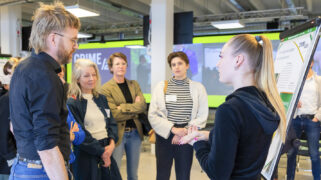Social Innovation Academy: strengthen solutions to social problems
On 11 and 12 March, 2013, the European Commission worked together with Kennisland, Nesta, and Euclid Network on the Social Innovation Academy to bring together 30 semi-finalists of the Social Innovation Competition.
- Betrokken KL'ers
- Chris Sigaloff
- Nikki Timmermans
On 11 and 12 March, 2013, the European Commission worked together with Kennisland, Nesta, and Euclid Network on the Social Innovation Academy to bring together 30 semi-finalists of the Social Innovation Competition. The competition was launched on 1 October 2012 in memory of Diogo Vasconcelos. The two-day event in EYE Film Institute Amsterdam was aimed to support the semi-finalists to refine and strengthen their solutions. Chris Sigaloff, chair of Kennisland, and Xavier Le Mounier from the European Commission, launched the Academy.
Watch a video impression:
After getting to know each other, Sarah Schulman, a scholar resident at Kennisland, raises the standards by asking the question what we define as doing ‘good’. Despite our best intentions and heaps of intentionality, we often miss the mark. Many solutions too often do not change the behavior of the hardest to reach, nor the behavior of public systems. Sarah shares her personal principles for creating good social solutions based on her own experience and stimulates the participants to formulate their own principles and to evaluate how these are met along the way.
In the second part of the first day, Simon Willis, a jury member of the competition, spurs participants to be inherently innovative, radical and disruptive. He also predicted the end of the charity model as we know it and challenges the social innovators to think about creative revenue models. The participants were afterwards divided into small groups to work on their projects. Each group was mentored by each of the committee members.
On the second day, Vicki Purewal from Nesta elaborated on the competition criteria and what needs to be included in the participant’s revised proposal for the final round. In the next session, participants could choose to join either a workshop by Nikki Timmermans (Kennisland) about how to improve their business model or a workshop by Sarah Schulman on identifying the stakeholders and the different needs they might have. After the lunch break, Karl Richter, a social entrepreneur himself, shared his knowledge on social investment.
Each of the participants then presented their project in a 90-second pitch focusing on four aspects of their projects: “Problem, Solution, Execution, and Ambition”. Direct feedback was given by the jury member Sara Piteira. The event was closed with a lively farewell reception.
The Social Innovation Academy was well received by the participants. This illustrates that there is a great need for creating a support system for social innovators. By learning from each other, getting new knowledge and skills and creating new networks, the promising and innovative field of social innovation can be strengthened. This is exactly why the European Social Innovation Competition is a valuable step in creating a support system for social innovators all across Europe.
- Betrokken KL'ers
- Chris Sigaloff cs@kl.nl
- Nikki Timmermans nt@kl.nl




